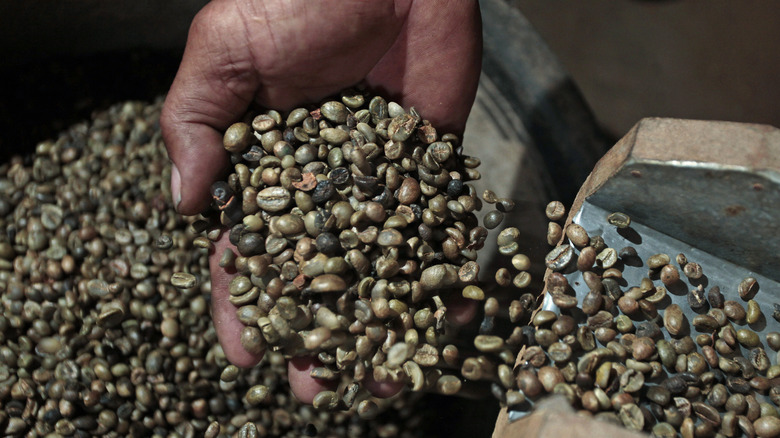El Nino May Be Coming For Your Coffee
Since the start of the COVID-19 pandemic, many of us have noticed shortages of certain food products on the shelves. Remember when nearly everyone started making bread as a stay-at-home quarantine activity and dry yeast seemed impossible to find? Canned corn wasn't safe from shortages either, and even ketchup packets became scarce. Post-pandemic, things seem to have gotten better, yet with some foods – such as rice, the supply of which has been affected by the war in Ukraine – and crops such as corn and wheat, which are expected to be majorly influenced by climate change in the near future, still aren't safe from shortages.
Now, one of the most recent projected food shortages is related to many people's favorite morning beverage: coffee. We have weather patterns, specifically, the encroaching El Nino, to thank for the potential shortage of robusta bean production coming from countries like Vietnam and Indonesia (via CNBC). Euronews says it is 90% likely to begin this summer, based on meteorological predictions. And those two affected countries, in addition to Brazil (which is also facing reduced production due to droughts), are among the biggest producers of robusta coffee in the world.
Here's how the robusta coffee shortage affects you
El Nino is a recurring event that causes warming in the Pacific Ocean. This pattern has major effects on the weather in Southeast Asia, such as countries like Vietnam and Indonesia, resulting in less rainfall and warmer, drier conditions. So what does it all mean for coffee production? According to CNBC, harvests of robusta beans, which are often used to make instant coffee and espresso, coming from this region are at risk. The news follows the revelation that the cost of robusta beans hit its highest point in nearly 12 years as of April (via Reuters).
Robusta coffee, which is becoming increasingly popular in areas of the world such as Asia, is known to be bitterer and contains more acid than arabica coffee. The latter is sold by coffee shops such as Starbucks and Dunkin' and which tends to be more expensive. A recent shortage in arabica beans had some suppliers turning to robusta beans. But per Reuters, production of arabica beans seems to be back on track, thanks to stabilizing weather patterns in growing areas such as Central and South America. Sounds like you might have to substitute your instant coffee or espresso, at least for now.

